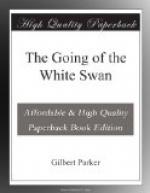When she fled from their hut one bitter day, as he roared some wild words at her, it was because her nerves had all been shaken from threatened death by wild beasts, (of this he did not know) and his violence drove her mad. She had run out of the house, and on, and on, and on—and she had never come back. That was weeks ago, and there had been no word nor sign of her since. The man was now busy with it all, in a slow, cumbrous way. A nature more to be touched by things seen than by things told, his mind was being awakened in a massive kind of fashion. He was viewing this crisis of his life as one sees a human face in the wide searching light of a great fire. He was restless, but he held himself still by a strong effort, not wishing to disturb the little sleeper. His eyes seemed to retreat farther and farther back under his shaggy brows.
The great logs in the chimney burned brilliantly, and a brass crucifix over the child’s head now and again reflected soft little flashes of light. This caught the hunter’s eye. Presently there grew up in him a vague kind of hope that, somehow, this symbol would bring him luck—that was the way he put it to himself. He had felt this—and something more—when Dominique prayed. Somehow, Dominique’s prayer was the only one he had ever heard that had gone home to him, had opened up the big sluices of his nature, and let the light of God flood in. No, there was another: the one Lucette made on the day that they were married, when a wonderful timid reverence played through his hungry love for her.
[Illustration]
[Illustration]
IV
Hours passed. All at once, without any other motion or gesture, the boy’s eyes opened wide with a strange, intense look.
“Father,” he said slowly, and in a kind of dream, “when you hear a sweet horn blow at night, is it the Scarlet Hunter calling?”
“P’r’aps. Why, Dominique?” He made up his mind to humor the boy, though it gave him strange aching forebodings. He had seen grown men and women with these fancies—and they had died.
“I heard one blowing just now, and the sounds seemed to wave over my head. P’r’aps he’s calling some one that’s lost.”
“Mebbe.”
“And I heard a voice singing—it wasn’t a bird to-night.”
“There was no voice, Dominique.”
“Yes, yes.” There was something fine in the grave, courteous certainty of the lad. “I waked, and you were sitting there thinking, and I shut my eyes again, and I heard the voice. I remember the tune and the words.”
“What were the words?” In spite of himself the hunter felt awed.
“I’ve heard mother sing them, or something most like them:
“’Why does the fire no longer
burn?
(I am so lonely.)
Why does the tent-door swing outward?
(I have no home.)
Oh, let me breathe hard in your face!
(I am so lonely.)
Oh, why do you shut your eyes to me?
(I have no home.)’”




